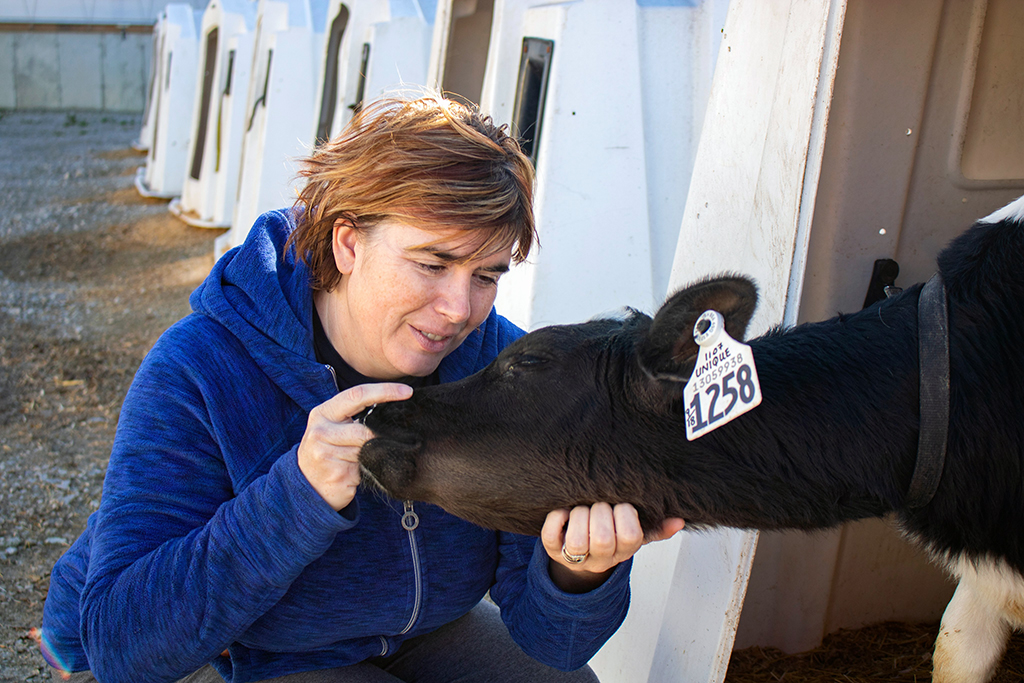Is rbST just a really big scary term?

Vicky Morrison, 42, has over 200 cows at her farm. She says the tag system for monitoring the cattle’s life has helped increase transparency in Canadian dairy trade. (Photo by Ryan Percy)
By Ryan Percy
Canadians are being told to relax and have a glass of milk, whether it comes from Canada or the United States.
The United States–Mexico–Canada Agreement is expected to give the United States access to up to 3.6 per cent of Canada’s dairy market. This has led to concerns for some Canadians due to the presence of rbST in American dairy. Recombinant bovine somatotropin is an artificial version of bST. It may also be called rbGH or recombinant bovine growth hormone. Concerns have been raised particularly over the fact rbST is not available to Canadian dairy farmers. This means rbST dairy may be imported to Canada. However, many do not understand why it is not allowed in Canada.
A 1999 study, conducted by an expert panel of the Royal College of Physicians and Surgeons of Canada about the safety of rbST consumption in humans, shows there was no biologically plausible reason found for concern about human safety if rbST were to be approved for sale in Canada. The only exception they found was a small chance of an immune response to high dosages of rbST. However, the panel said these kinds of reactions would occur with naturally produced bST, as well as the artificially rbST.
Dairy farmer Vicky Morrison has been around cows for 42 years and is currently chair of the Essex-Kent Dairy Producers’ Committee. She started her dairy career in Ireland before coming to Woodstock in 2007 and moved to her current farm in Essex in 2013. She said compared to the United States, the Canadian government has taken more proactive steps to look after livestock.
“We have stricter regulations for somatic cell count, we cannot use rBST and we have stricter regulations for welfare. All of those things, as far as the consumer is concerned, means the animals in Canada are better cared for,” said Morrison
In 1998 the Canadian Veterinary Medical Association studied the impact of rbST on cows. In cows which have only given birth once, an injection of rbST lead to them producing roughly 11 per cent more milk, cows that have given birth more than once saw an almost 16 per cent increase in their milk.
Cows given rbST produced milk which contained a very small increase in both protein and butterfat content. However, the cows were found to be approximately 25 per cent more likely to develop mastitis, a disease which can lead to the udders going gangrenous. Further, cows had an approximately 50 per cent increase in risk of clinical lameness and their risk of non-pregnancy increased. Finally, the cows would see a deterioration of health since increased milk production was not met by an equal increase in food intake.
The rbST’s lack of approval for use in Canadian dairies is for the well being of the cows.
Allison Miller is the communications manager for the Michigan Milk Producers Association and said some American dairies are taking the same path as Canada.
“The drug is not used on any herds in the Michigan Milk Producers Association,” Miller said. “In our dairy cooperative, which is a farmer-owned by members in Michigan, Indiana, Ohio and Wisconsin, all farms are required to produce milk free from rBST since 2007.”
The Canadian Food Inspection Agency does not test for rbST because previous studies show it is safe to consume. They do check for all other kinds of nasty things possibly hidden inside dairy coming to Canada.
Daniel Burgoyne, 51, grew up on a farm, worked for Agriculture and Agri-Food Canada and is now the national manager of food imports for the Canadian Food Inspection Agency. He said if defects are found in the produce CFIA agents look through, the importer has two options: return it or destroy it. There are no fines as the importer having to destroy produce is punishment enough.
“If you were to put yourself in the shoes of the importer nobody would want to spend money bringing the product to Canada and the product is not good,” Burboyne said. “If you want to sell cheese directly to consumers and you are importing a product that continues to be not in compliance, you have nothing to sell to anybody. The industry does not keep importing products that give them a bad reputation.”
If Canadian consumers still do not want to use products with rbST they have two options. If they do decide to buy the imported U.S. milk they can look for labels saying the product is either rbST or rbGH free. They also have the option of buying Canadian milk, looking for the white and blue “100% Canadian Milk” logo or the new “Dairy Farmers of Canada Quality Milk” logo which is eventually replacing the other one entirely.
Either way Canadians will know the milk they are drinking, cheese they are melting or ice cream they are eating is coming from a cow free of rbST.


